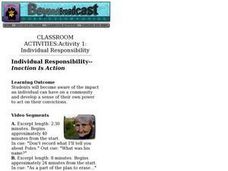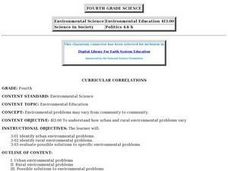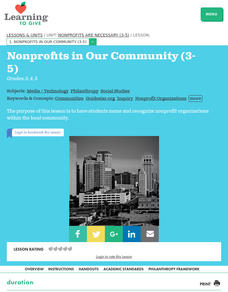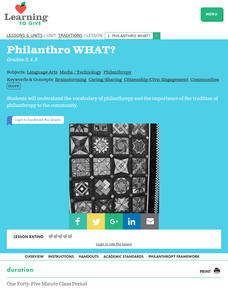Curated OER
How Typical or Atypical is Your Community?
Young scholars analyze and answer specific questions posed by the teacher about their community. They assess how typical a community is by comparing its characteristics to those of the whole nation. They determine how typical or...
Curated OER
Individual Responsibility--Inaction Is Action
Students view a video that explores the impact an individual can have on a community. They consider the consequences of acting or not acting on their own convictions and participate in a class discussion to share their observations.
Curated OER
The Elements of a Community--Who Belongs, Who Decides?
Students identify the elements of a community. They watch a video excerpt, complete a class web diagram, answer discussion questions, and describe the controversy from the video.
Curated OER
Who's the Boss?
First graders identify their community, state and national leaders. They participate in an activity to explore the roles each of these officials have. They are shown pictures of the leaders as well.
Curated OER
Environmental Education (Grade 4)
Fourth graders examine environmental concerns that affect their community. They work together to develop possible solutions and share them with the class. They ask questions to end the lesson.
Curated OER
Environmental Education -- Communities
Fourth graders identify urban and rural environmental problems. They work together to develop possible solutions. They ask questions to end the lesson.
Curated OER
The African American Experience: A Research Quilt
Learners research the contributions of African American leaders of the 1900's, They design and construct a quilt square showing the achievements of that individual.
Curated OER
Mrs. Portillo
Students view a film about the importance of working together. They idenitfy different people's roles in the community. They participate in activities in which they practice Spanish vocabulary.
Curated OER
Nonprofits in Our Community
Students identify nonprofit organizations within their local community. They practice using the yellow pages to locate these organizations. They use an organizer to keep all of the information they gathered organized.
Curated OER
We Hope This Helps
Young scholars create writings and drawings to share with a children's hospital. They reflect on the project and how they have changed as a person. They also discuss how the community benefited as a whole.
Curated OER
Exploring Our Community
Students identify nonprofit and profit organizations in their community. They discuss why it is important to have both types of organizations. They create a land use map of their community.
Curated OER
Which Shall We Pick?
Students compare and contrast the value of different organizations in their community. They listen to subjective and objective perspectives to make a decision. They use the decision-making process to decide which organization needs...
Curated OER
Philanthropy is Everywhere Lesson 1: Everyone Can Be a Philanthropist
Young scholars examine their classroom as a community and find ways that individuals can support that community by doing philanthropic acts. They draw and label a picture of themselves participating in an act that betters the community.
Curated OER
Community Foundations and Procedure
Students research a foundation in their community and how it helps its citizens. They form a youth advisory committee and make recommendations to the mock boards of directors. They practice using parliamentary procedure to complete their...
Curated OER
What's In A Name?
Students analyze themselves as members of the community. They choose a name to describe themselves and explain why they choose the name they did. They identify activities they perform in and out of school to help the community.
Curated OER
Our Area's History of Philanthropy
Students research the local area's history. They identify situations in which attention was needed to meet basic needs. They examine the life of a philanthropist in their area.
Curated OER
Who's In, Who's Out?
Students identify feelings they have when being included or excluded in a group. They develop a survey to give to different groups who feel excluded. They present the information they gather from the survey to the class.
Curated OER
Reaching Out to the Community -- Beyond
Students identify the differences between common good and community capital. They discover their responsibility to contribute to the greater good. They write a letter and design a poster to promote their ideas.
Curated OER
Eating Together as Good Citizens
Learners explore their sense of community. They create a fruit salad, compare the salad to their community, read a book about diversity, share the salad with another class, and create a fruit floor graph.
Curated OER
Philanthro What?
Students discuss what it means to be a philanthropist and how important philanthropists are to the community. They discuss the tradition involved in philanthropy and create a show and tell "Philanthropy Teaching Quilt" using the various...
Curated OER
People Who Care
Second graders brainstorm how they care about certain people in their lives. They discuss how they take care of those people or pets. They draw a picture of the people who care about them.
Curated OER
Citizenship and Community
Students discuss why they believe exploring the topic of citizenship in school is important. They rank citizenship topics according to their importance. They examine the possibility of citizenship bringing communities closer together.
Curated OER
Settlers: Creating Family Trees & Historical Plays
Students conduct research about the founding families of their communities. They compile historical contexts for the era and develop a family tree and historical skit with their findings.
Curated OER
Government Lesson Plan 17
Students analyze evidence of society's socioeconomic goals, prioritize goals, and identify the opportunity costs of limited government funding.

























